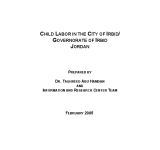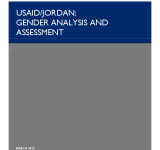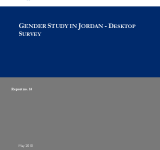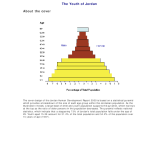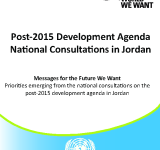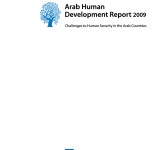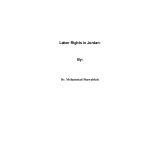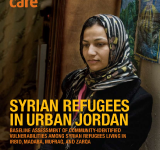This research study aims to investigate child labor in Irbid to provide a deep understanding of and knowledge about the socio-economic and cultural context of working children in Irbid. It also aims to propose intervention programs that maximize the effectiveness of the Family and Childhood Protection Society (FCPS);; an NGO in Irbid that works on issues related to children. Various study results have shown that children often work in dangerous and hazardous conditions where they are exposed to physical and psychological abuse;; in addition to exploitation in terms of minimal pay and long working hours. Both qualitative and quantitative methodologies were used to conduct the research presented in this report. In-depth interviews and questionnaires were used to collect data from all organizations working on child-related issues and from working children and their family members.
والعمالة
The report presents an up-to-date analysis of gender disparities in Jordan to inform development assistance programs by the USAID for the 2013-2017 strategic plan. The assessment report is prepared by the Global Health Technical Assistance Project;; funded by USAID Jordan and therefore;; it is based on a literature review and field work of the 21 focus group discussions held in Amman;; Irbid;; Tafileh and Zarqa. The report establishes that Jordan has begun to transition to a knowledge-based economy with the national advantage as its people. It also points out that despite the investments that have helped address gender equality issues;; Jordan continues to bear low female participation in the labor markets;; gender stereotypes about the role of females and males and conservative cultural norms. The report includes a sector-by-sector analysis;; recommendations;; gender review and an illustrative implementation plan. It concludes with key recommendations on the wide breadth of the USAID Jordan portfolio with a key emphasis on gender issues.
The report presents the findings of a desktop survey conducted to review gender studies in Jordan with an overall goal of the survey as to ensure that gender is adequately addressed throughout project research;; analysis and activities of the Public Action for Water;; Energy and Environment Project (PAP). Under the PAP mandate to encourage water and energy conservation and to support behavior change towards more conservation and efficient practices both at the household level and in the commercial;; industrial and civil society arenas using social marketing behavioral methods;; the report is based on a gender desktop review of existing research on gender and natural resource management in Jordan. It capitalizes on the growing body of research on gender across sectors in Jordan including natural resource management;; to apply and adapt the findings to the PAP project activities. The report concludes with recommendations for the PAP projects such as donor collaboration;; improvement of women’s knowledge of water and energy saving methods;; engagement and creation of women’s participation to promote and support opportunities for small;; women-owned business promoting water and energy saving technologies and promotion of alternative technologies.
This first Jordanian National Human Development Report focuses on the condition and role of young people in the country;; arguing that the capacity of young Jordanians to contribute to national development and to compete in the global economy will determine whether Jordan remains a low middle income country or joins the ranks of the world's advanced economies. The Report looks at young people's lives and aspirations in the three key areas of education;; employment and social integration;; finding for example that 60% of all unemployed people are below that age of 25. The Report concludes that although Jordan has made significant advances in building people's capabilities;; there is room for improvement in aspects of gender-equality;; employment;; income and quality and relevance of education;; and ends with a substantial section on policy recommendations suggesting strategies for addressing this shortfall
Jordan is one of the 88+ countries which carried out national consultations worldwide. 10 countries from the Arab region were selected to run the post-2015 national consultations: Jordan;; Djibouti;; Egypt;; Morocco;; Sudan;; Algeria;; Yemen;; Iraq;; Saudi Arabia;; and Lebanon. The Jordanian national consultations have been a lead contributor to the first preliminary report of the UN Development Group (UNDG) issued in March 2013 and entitled “The Global Conversation Begins – Emerging Views For a New Development Agenda”;; and also to the UNDG Global report “A million voices: The World We Want”;; launched by the UN Secretary-General and UNDG Chair on 9 September 2013. The Global Report constitutes a milestone in the dialogues to shape the post-2015 development agenda. Its findings have contributed to the UN Secretary-General’s report to the 68th session of the General Assembly in September 2013.
The fifth volume in the series of Arab Human Development Reports sponsored by the United Nations Development Programme and independently authored by intellectuals and scholars from Arab countries. The report argues that human security is a prerequisite for human development;; and that the widespread absence of human security in Arab countries undermines people's options.
This paper aims at shedding light on the labor rights in Jordan;; particularly for those who are working in the informal sector;; through identifying the factors that impede them from enjoying such rights and;; thus;; coming up with the appropriate recommendations in this area.
This report is a baseline assessment of community-identified vulnerabilities among Syrian refugees living in Amman;; Irbid;; Madaba;; Mufraq;; and Zarqa. The purpose of this report is to identify urban Syrian refugees’ current coping mechanisms and any gaps in services available to Syrian refugees in Jordan. The research methodology is both qualitative and participatory in design;; drawing from the UNHCR tool for Participatory Assessment in Operations. This report presents only the data from household interviews;; baseline assessment;; and the follow-up focus groups conducted with community members. The number of households surveyed was 240;; with a total number of 1;;476 household members and 89 focus group participants representing 534 household members. The report proposed general recommendations and interventions to deal with the main highlighted challenges (cash assistance;; strengthening community links;; vocational training;; physical activities ...etc).
